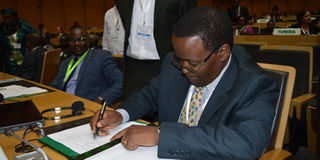African health ministers sign declaration to increase use of vaccines

Dr David Kiima from the Ministry of Health signs the declaration on immunisation in Africa during the first Ministerial Conference on Immunisation in Africa in Addis Ababa, Ethiopia between February 24 and February 25. Dr Kiima was representing Health CS Dr Cleopa Mailu. PHOTO | ELIZABETH MERAB | NATION MEDIA GROUP
What you need to know:
- Former Tanzanian President, Jakaya Kikwete stressed on the need for governments to go beyond making declarations and implement them.
- A new report released during the conference paints a mixed picture on accessibility of vaccine in the continent.
- Three critical diseases — measles, rubella and neonatal tetanus—remain a big threat to the continent.
Health ministers from 20 African countries last week signed a declaration to increase the use of vaccines in preventing of infectious diseases in a bid to close immunisation gap by 2020.
The declaration signed during the closure of the Ministerial Conference on Immunisation in Africa held in Addis Ababa, Ethiopia last week, brought together ministers of health and finance.
Ethiopian Prime Minister, Hailemariam Desalegn is expected to present the Addis Ababa Declaration on Immunisation to African Heads of States at this year’s 26th Summit of the African Union in June.
The conference, which was hosted by the World Health Organisation Regional Offices for Africa and the Eastern Mediterranean in conjunction with the African Union Commission, was the first ministerial-level gathering which focused on ensuring that children across the continent have access to vaccines.
The declaration commits countries to increasing domestic financial investments in order to deliver routine immunisations and roll out new vaccines.
This is backed by a report published by the John Hopkins Bloomberg School of Public Health that states that expanding use of vaccines could save up to $44 for every dollar spent.
“We all agree that vaccines are one of the most cost-effective solutions in global health. Investing in immunisation programs will enable African countries to see an outstanding economic benefit,” said Dr Ngozi Okonjo-Iweala, chair of the Gavi Board.
“If we can ensure that all African children can access life-saving vaccines, no matter where they are born, we will have a golden opportunity to create a more prosperous future for communities across our continent.”
Speaking at the same event, former Tanzanian President, Jakaya Kikwete stressed on the need for governments to go beyond making declarations and implement them.
“If Africa is to realise “the African Century” and secure its future, as envisioned in the African 2063 Agenda, we should settle for nothing less than a continent where no child dies from preventable diseases,” said Kikwete.
“Important as these declarations may be, the most important thing is implementation. Let us come out of this Conference with strong resolve for resolute action.”
Mr Kikwete, who is also a global ambassador for immunisation, said that the need for implementation was because “implementation of the universal access to immunisation by 2020 agenda as envisaged by the Global Vaccine Action Plan is largely off track.”
CLOSE OUTSTANDING GAPS
“We should therefore seek ways and means to close forever the outstanding gaps in immunization that still leave our children vulnerable to preventable diseases,” added Kikwete.
“We all agree that vaccines are one of the most cost-effective solutions in global health. Investing in immunisation programs will enable African countries to see an outstanding economic benefit,” said Dr Ngozi Okonjo-Iweala, Chair of the Vaccine Alliance (Gavi) Board.
“If we can ensure that all African children can access life-saving vaccines, no matter where they are born, we will have a golden opportunity to create a more prosperous future for communities across our continent.”
A new report released during the conference paints a mixed picture on accessibility of vaccine in the continent.
According to the report, while Routine immunization coverage has increased considerably across Africa since 2000, with success in introduction of new vaccines, one in five children still do not receive all of the most basic vaccines they need.
Still, three critical diseases—measles, rubella and neonatal tetanus—remain a big threat to the continent while at the same time many countries have fragile health systems that leave immunisation programs vulnerable to shocks.





